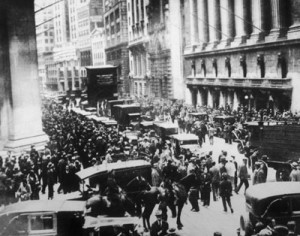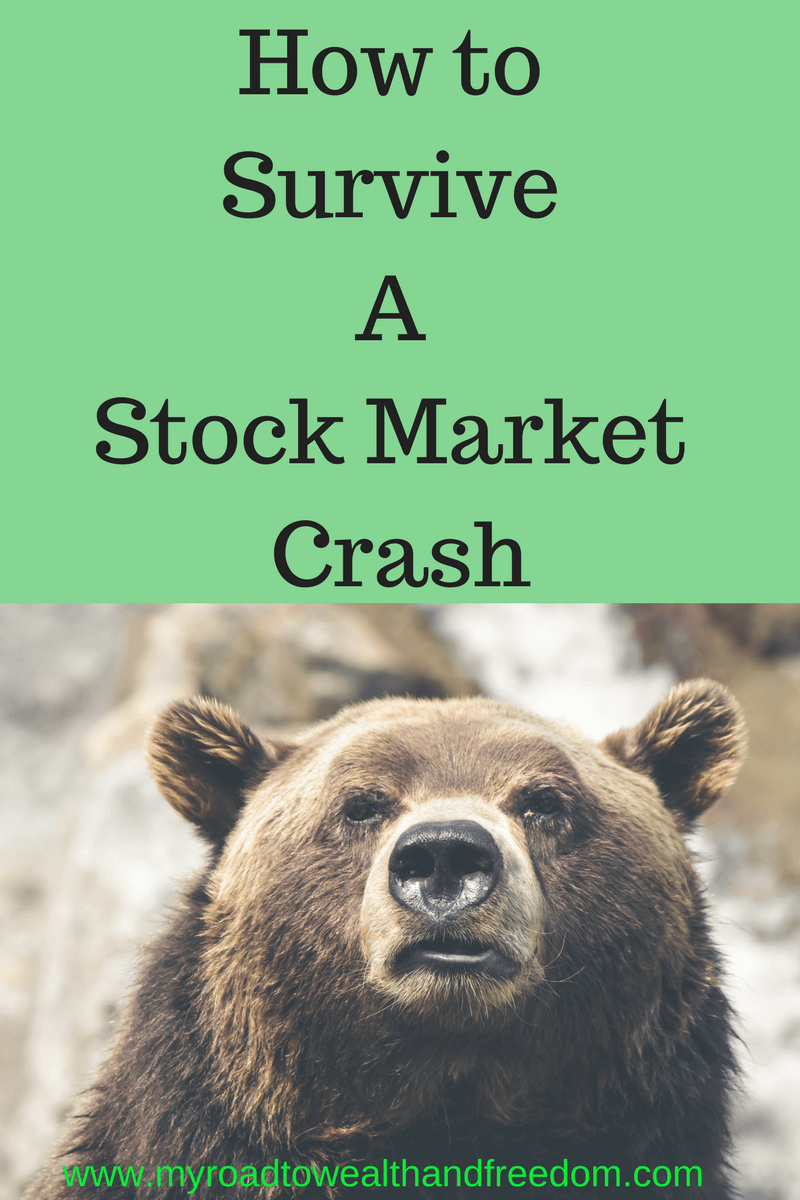Here is my post on how to survive and profit from a stock market crash. There’s no question that stock market crashes are scary events. I’ve been through 2 big ones since I started investing and it is certainly no fun losing money, that’s for sure.
One minute your investment portfolio is growing and the next all those hard won gains have evaporated and you’re deep in the red. Everywhere you look there’s fear and panic that results in more selling which only further depresses the markets.
As scary as stock market crashes can be, the silver lining is that they offer incredible buying opportunities for the long term investor.

How Can We Cope with a Stock Market Crash?
Contrary to what all the financial gurus and talking heads say on TV, a stock market crash is not the time to think about a portfolio makeover. Traders and active money managers always say that when the market rolls over they get more defensive and try to do all sorts of fancy things to limit their losses.
In my opinion, people would be wise to ignore this kind of advice because they’ll just end up losing more money by turning what are essentially paper losses into real ones. The sad reality is that once the market crashes, it’s already too late! The damage has already been done. That’s why it’s important to have a financial plan, know your risk tolerance, and know what you’re invested in.
I regularly review my investment portfolio, usually once a month when I’m writing my net worth and dividend income reports – in case I need to make any changes. But I never do because I can’t imagine owning anything else. I’ve owned my portfolio of dividend stocks for years and have no intention of selling them as they are an important source of income for me and play a big role in my plan for financial independence.
In fact, most of my stocks are dividend aristocrats – meaning that, not only have they paid a dividend for many years, but they have regularly increased that dividend payout over many consecutive years. That is a major benefit of being a dividend investor and Just because they have fallen out of favour temporarily does not mean thy are bad investments or that their fundamentals have changed. On the contrary, I expect that they will continue to do well for many decades to come so I’m very happy to own them.
So my advice on how to cope with a market crash is not to get defensive, re-position your portfolio and put in stop losses etc. No, my advice is the exact opposite. Change your mindset and get aggressive! If you’re happy with your investments then buy more at bargain basement prices. If, on the other hand, you’re too scared to buy after the market has collapsed then the best thing to do is ignore financial news and do absolutely nothing. Just sit back do nothing and wait it out. The stock market has always bounced back over time.
Here are 3 things anyone can do to survive and even profit from stock market crashes:
Stay Calm and Stay Invested!
Don’t panic and keep investing regularly. Remember that the most important factor in investing is the time factor. Even if you buy at the absolute height of the market, over time, you’ll still do very well.
Remember that as much as 60% of market returns come from dividends. By staying fully invested you’ll still get to collect tax efficient dividend income and if you’re smart enough to reinvest it to buy more shares, then you’ll be buying regularly at many different price points. This is called dollar cost averaging. Over time, this reduces your costs of owning a particular stock or index fund because some shares were purchased at high prices and some at lower prices. If you stay invested and keep buying when prices are low, there is very little that will hurt you in the long run.
Take the Long View by Thinking Long Term
In the short term, markets go up and down but over time, they tend to trend higher. Try to imagine where you’ll be in 5, 10 or 20 years. That’s why it’s important to stay invested and keep on buying because your future self will thank you! Stick to your long term financial strategy.
Some people worry too much about capital gains and that’s the great thing about being a dividend investor. I find that my dividend income is far more precious to me than whatever unrealized capital gain that I may have. As I’ve said before, my dividend income is the only real “trend” that I’m focused on and as long as it is always growing then I could care a less about market noise.
Buy the Bargains!
In my opinion, it’s unlikely that the stocks of great companies will remain in the dumps for any significant period of time, so I’m buying the bargains and I’m getting paid some big fat juicy dividends while I wait. I’m in a rapid accumulation phase of building wealth so I need to buy every deal that I can find. I want to own as many high quality assets as I can and market crashes or corrections offer an opportunity to accelerate my plan to achieve financial freedom.
Assets will always fluctuate in price, but it’s the income that they generate that I’m more focused on. Despite the market crash, I’m still convinced that a combination of high quality dividend paying stocks and real estate are the best assets to own in order for me to reach my long term financial goals.
It’s important to block out all the noise and media hype and look at market crashes as opportunities to buy great companies at great prices. Lately on the Canadian market, banks and oil companies have been crushed. Most bank stocks yield over 4% and some are nearing 5%. In the past month I’ve been buying shares in Toronto Dominion Bank (TD) and Scotiabank (BNS) and I plan to keep buying more shares.
I’ve learned to welcome market crashes because I now see them for what they are: major buying opportunities. My favourite stocks are on sale anywhere from 25-50% off. Think about that for a minute. If we saw a big flat screen TV 50% off we’d go nuts at such a great deal. Why don’t most people feel the same way when a solid Blue Chip dividend aristocrat like Scotiabank or TD is 20-30% off and yielding almost 5%. That’s double what a 30-year bond will give you. Plus that 5% will increase by at least 6-8% a year forever! If you’re worried about the safety of that dividend you may find comfort in the fact that ever since Scotiabank started paying dividends nearly 200 years ago, they have never missed a payment!
Photo Credits:
“1929 Stock Market Crash,” Public Domain courtesy of Freelancer Journalist [CC0], via Wikimedia Commons
